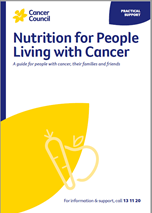- Home
- About Cancer
- Living well
- Complementary therapies
- The role of exercise and nutrition
- Taking care with special diets during treatment
Taking care with special diets during treatment
During treatment, following the diets listed below may stop you getting enough nutrients for your body to work properly.
| Gerson therapy | This involves drinking fresh juice several times a day, taking supplements, and having coffee enemas. There is no scientific evidence that Gerson therapy is an effective treatment for cancer, and evidence shows that coffee enemas can be dangerous if used excessively. |
| high doses of vitamins | Some people believe that taking high doses of certain vitamins strengthens the body’s immune system during cancer treatment. There is little evidence to support this claim. In fact, many vitamins and minerals can be toxic at high levels (for example vitamin E in high doses may increase the risk of bleeding). They may also affect how radiation therapy, chemotherapy and other drugs work. |
| alkaline diet | This diet claims eating high alkaline foods such as green vegetables, fruits, oily fish and nuts lowers the acidity levels in the body. A low acid level is said to stop cancer growth, but there’s no evidence to support this claim. |
| macrobiotic diet | Generally, this diet consists of wholegrains, fruits and vegetables, and soups made with legumes and fermented soy (miso). This diet may cause you to lose weight. There is no evidence this diet cures cancer. |
| paleo diet | This diet consists of fruits, vegetables, seeds, nuts, meats and eggs, but excludes grains and dairy products. Eating grains is essential for a healthy digestive system. This diet is not recommended during cancer treatment. |
Keep your complementary therapists and other health professionals informed about any special diets you try before, during or after cancer treatment. This will help them give you the best possible care.
→ READ MORE: Whole medical systems
Video: How to eat well after a cancer diagnosis
More resources
Dr David Joske, Clinical Haematologist, Sir Charles Gairdner Hospital and PathWest, Chairman and Founder Solaris Cancer Care Foundation, Clinical Professor of Medicine, The University of Western Australia, WA; Australasian Integrative Medicine Association (AIMA); Dr Robert Blum, Clinical Director, Cancer Services, Bendigo Health, NSW; Sally Brooks, Senior Pharmacist, Medicines Information, Peter MacCallum Cancer Centre, VIC; Dr Suzanne Grant, Senior Research Fellow, NICM Health Research Institute, Western Sydney University, and Chris O’Brien Lifehouse, NSW; Prof Danforn Lim, Adjunct Professor and Advisory Board Member, NICM Health Research Institute, Western Sydney University, and Adjunct Professor, UTS, NSW; Christina Line, Statewide Services Senior Coordinator, Cancer Council WA; Jen McKenzie, Physiotherapist (Lymphoedema) and ESSA Accredited Exercise Physiologist, The McKenzie Clinic, QLD; Simone Noelker, Wellness Centre and Pastoral Care Manager, Ballarat Regional Integrated Cancer Centre, VIC; Dr Nirzari Pandit, General Practitioner, RACGP Specific Interests Integrative Medicine Group, NSW; Georgie Pearson, Consumer; Cris Pirone, Counsellor, Cancer Council SA; Dr Elysia Thornton-Benko, Specialist General Practitioner, and UNSW Research Fellow, NSW; Kirsty Trebilcock, 13 11 20 Consultant, Cancer Council SA.
View the Cancer Council NSW editorial policy.
View all publications or call 13 11 20 for free printed copies.

